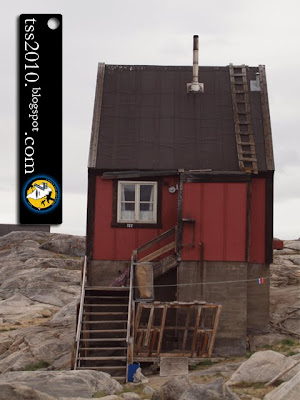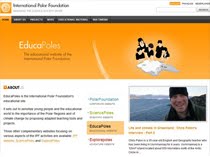It was an overcast day that greeted me when I crawled out of the tent. The heat of the day before had made me reconsider the merits of sleeping through the day. An Arctic Fox woke me and I decided to get going, not least to arrive within the opening times of Pilersuisoq - the local store in the settlement of Ikerasak; I would be arriving at the first of the Seven Settlements today.
The paddling was very pleasant. Overcast and cool, I spent a lot of time looking along the shore, still half-convinced I would see something of interest or even see sign of the unfortunate men lost in the tragic boat accident earlier.
Paddling along the coastline; there is always another point to round. It is like the false summits when hiking in the mountains. What you see before you is rarely the final destination. There is always a little further to go. I found that when I could see my destination I usually had a few more hours of paddling, especially on open crossings. When I could taste the campsite before me I had yet one more hour. It was frustrating at times and paddling faster just didn't seem to make any difference. Getting used to the distances in Greenland is difficult. Geographic features, be they islands or mountains, are always, always further away than one thinks they are.
Nearing Ikerasak I started to see life on the tiny outlying islands. On these islands, Greenlandic sledge dogs would roam free, not even tempted to swim to the mainland - smart dogs! They seemed to be more content than the dogs chained in the larger settlements and towns, and the pecking order was firmly established. The dogs stared at me as I paddled past, losing interest as I showed no sign of dropping off a hunk of seal meat. (Some days later I would meet more hungry dogs on several islands outside Saattut.)
I was a little curious as to how I would be received in Ikerasak. I have been there twice before; once by snow scooter, a second time in a taxi across the sea ice, never in the summer. Each time I have been in Ikerasak it has been to visit Betina and Thomas, colleagues of mine teaching in the settlement school. I have great respect for their work as teachers and could see the results of their hard work when I received the 10th graders from Ikerasak during their final year of schooling. Jane and I drove across the ice to be at Betina and Thomas' wedding a few years ago.
My friends have now moved on and, short of a few student connections, I don't really know many people in Ikerasak. I must have arrived at a particularly quiet time too as there were few people wandering about that I could see. Most people were at work or inside on this cloudy day. Some people might even be sleeping as it is not unusual to be active at strange times due to the 24-hour light that can play havoc on one's daily rhythm. As it turned out I met just a few of my former pupils and spent most of the few hours in the settlement making the promised progress calls to Lars Simonsen, Jane and, of course, my mum!
In the build up to the expedition I had talked a lot with my mum about being safe. Jane and I had avoided talking too much about the subject while Lars was extremely practical and a lot more switched on than I was. I would soon discover what it was like "not knowing" when my blasé attitude was put to the test. However, I did enjoy making contact and assuring everyone that I was well and enjoying myself.
Betina and Thomas' house.
The church in Ikerasak.
The kindergarten.
A thin house.
After a little sightseeing in Ikerasak I was actually ready to leave again. It just wasn't what I had anticipated. Maybe I just slipped in unnoticed or, more likely, I was just another "Dane"/white faced tourist poking around with his camera. I have come to the conclusion that cameras are crap in areas frequently visited by tourists. I don't think Ikerasak has as many visits by cruise ship passengers as Ukkusissat for example, but I definitely stood out. One thing I did find amusing was my sudden need to talk to people - and you think the camera was the problem! - and when I spotted Michael, a student of mine, I launched into verbal diarrhoea. Clearly I had been out in the boonies too long with nothing but foxes for company.
It had been three days!
Leaving Ikerasak I got my groove on and found the boat and paddle responded well and I blasted away for an hour across the bay to my next campsite. It felt good. All my somewhat dulled expectations of the first settlement though resulted in an interesting diary entry that night:
Now I realise, as I perhaps have always known, the Seven Settlements are purely way-points on a deeply personal journey proving to myself that I have what it takes. Pissing my territory and putting ghosts of inferiority to rest. The language be damned, I am who I am and I can do what I say I will! As the icebergs crash and fall around me I paddle on, playing it safe and making progress all the same. I know my limitations but I also know my strengths and capabilities: paddle on!
Growing up in a split family, being raised by my mum alone, competing for the attention from my father and his new family, encountering problems dealing with men in positions of authority during both my schooling and professional life, I have always carried a bit of a chip on my shoulder; an inferiority complex fostered, I believe, by the fact that deep down I might have believed that I wasn't good enough for my father. This has been frustrating at best and downright destructive at worst. I can, fortunately, thank my mum for the drive I have to experience new places, cultures and experiences, to suck the veritable marrow from the bone of life. This ambition to prove myself, however, has often resulted in challenging conflicts where I have always known I have the capability to do a thing but lacked the sense of self-confidence to show others. It was interesting for me to see this manifest itself through the words I wrote on the pages in my diary. This expedition was turning into an inner journey, and I could feel that it was coming perhaps 20 years or so late.
Paddle on!
































Very interesting journey's here. Yea, two thirds of mankind is covered by the flood of condemnation. Ye who climbs the high mountain to view beyond mans horizon, will find refuge from the unnatural world.
ReplyDelete